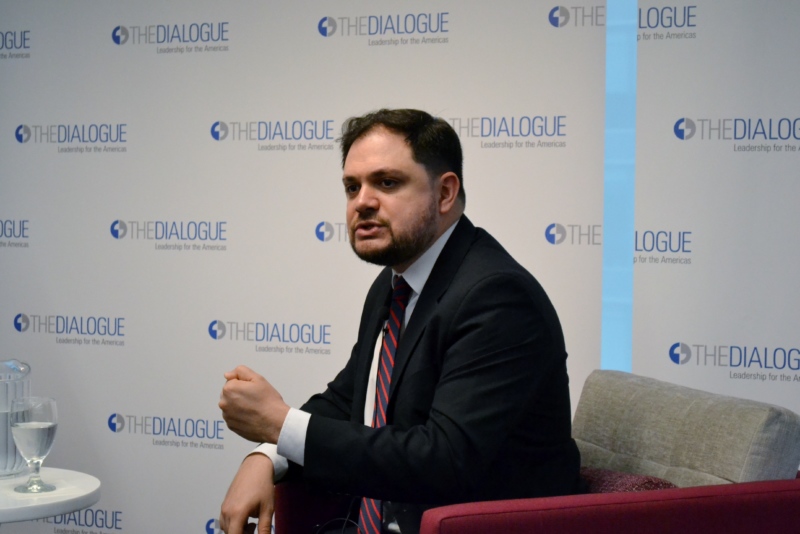Rising Brazil: The Choices Of A New Global Power
What should we expect from a newly powerful Brazil? Does the country have the capacity and leadership to be a central actor in addressing critical global and regional problems?
On September 26, the Inter-American Dialogue hosted Dr. Matias Spektor, Associate Professor at the Fundação Getulio Vargas and columnist at Folha de S. Paulo. The discussion, moderated by Michael Shifter, focused on Brazil’s political crisis and the threats to Brazilian democracy that exist today.
On its face, Spektor explained, Brazil is a functioning democracy given that it has typical democratic mechanisms, such as regular elections and universal suffrage. However, in Brazil, democracy coexists alongside different phenomena that undermine rule of law, such as violence, deep networks of corruption, and a lack of functional checks and balances. Moreover, because of Brazil’s multi-party system, the president must form a coalition of multiple parties in order to have the requisite support to govern. This system of “coalitional presidentialism” often encourages rent-seeking behavior that undermines popular accountability and perpetuates the political corruption that exists in the South American country. As a result of this system of governance, corruption has become endemic in the Brazilian political system. While this corruption is not unique to Brazil, recent events have brought to light the degree to which it influences the political system.
One particularly salient example of such an event is the Lava Jato case, which, Spektor argued, has unveiled the extent to which the judiciary system is subject to external pressure. In Brazil, core watchdog institutions, such as the Supreme Electoral Court and the Federal Accounts Auditing Court, are mired in the same corruption they are meant to be prosecuting. The Lava Jato case is a product of a small, but exceptional, group of individuals who have been able to mobilize popular support for the investigation. However, a “perverse and persistent coalition between the executive, legislative and judicial” branches of the government has continually attempted to undermine the efforts of the investigation.
"What's the mood of the upcoming elections?" asks @MichaelShifter. Hear @MatiasSpektor's answer 📺: https://t.co/dsm86gw8me #BrazilMalaise pic.twitter.com/NQ8MJaQvG1
— The Dialogue (@The_Dialogue) September 26, 2017
Former President Dilma Rousseff was not able to shield her administration from the investigation because her power within the political class was insufficient, in spite of the fact that she was more popular than her Vice President and current President Michel Temer. Mr. Temer, despite having an extremely low popularity rate, has been able to survive the fallout from the investigation thus far, in part because he is more powerful than his predecessor within the political class. Spektor also noted that, along with the political crisis, there is a growing economic crisis in Brazil -- the purchasing power of the middle class has fallen and the country has the most closed economy of the G20 group. Spektor emphasized the need for renewed economic growth.
In the upcoming election, Spektor expects that there will be increased polarization, with “the politics of anger against the political class” being the prevailing sentiment in the country. He noted that even politicians that enjoy high poll numbers also garner high levels of disapproval, making today’s politicians less popular broadly. Spektor also pointed out that the Brazilian electorate is young, meaning that social media will likely play a larger role in the elections than it has in the past. The center-right, as a political force, will be likely to succeed in the elections if they are able to build a compelling narrative around security while continuing to stimulate the economy.
The challenges that Brazil faces are not easily overcome. However, if the country can critically examine its institutions and find pragmatic solutions to problems, it certainly has the potential to further solidify its role as a leader in the region.
What should we expect from a newly powerful Brazil? Does the country have the capacity and leadership to be a central actor in addressing critical global and regional problems?
President Lula da Silva triumphantly announced that he and his Turkish counterpart had persuaded Iran to shift a major part of its uranium enrichment program overseas—an objective that had previously eluded the US and other world powers. Washington, however, was not applauding.
Brazil’s rising stature and influence will be on display when President Dilma Rousseff arrives in Washington this week.
 Inter-American Dialogue / Ben Raderstorf
Inter-American Dialogue / Ben Raderstorf